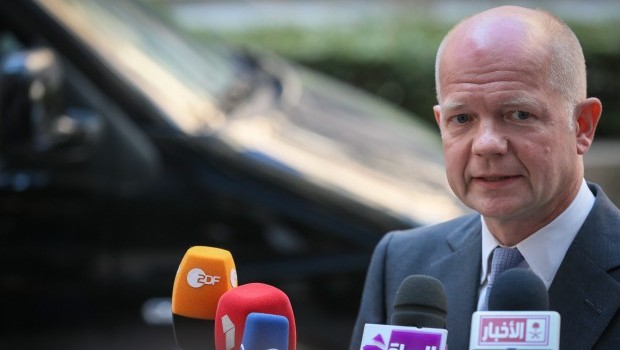
A file photograph showing British foreign secretary William Hague speaking to media as her arrives for a Foreign Affairs Council meeting at the EU Council headquarters in Brussels, Belgium, on July 22 2013. (EPA/JULIEN WARNAND)
Senior officials from all three countries have said in recent days that it was increasingly clear that an attack with chemical weapons had taken place, and that the Syrian government was likely responsible.
International media reports said that the prime minister of the UK and the French and US presidents had spoken by phone over the weekend to discuss possible responses to last week’s attack, with the European leaders offering their support if Obama decides to proceed with strikes using cruise missile and other long range “stand-off” weapons on Syrian government targets.
The US has reinforced its naval presence in the eastern Mediterranean, and now has four destroyers armed with cruise missiles on station. Britain’s Royal Navy also has a cruise-missile-armed submarine on station in the area, according to reports in the British press.
Speaking on BBC radio on Monday morning, British foreign minister William Hague said diplomacy had “failed so far,” adding, “We, the United States, many other countries, including France, are clear that we can’t allow the idea in the 21st century that chemical weapons can be used with impunity.”
Hague also hinted that military action could take place without UN authorization, saying that the UN Security Council had “failed to shoulder the burden,” and due to the urgency of the increasingly poor humanitarian situation in Syrian and neighboring countries.
His French counterpart, Laurent Fabius, told French radio station Europe 1 that last Wednesday’s attack in the Ghouta district of Damascus would be met with a “proportional response.”
“It will be negotiated in coming days. All the options are open. The only option that I can’t imagine would be to do nothing,” he added.
Obama reportedly met with his senior national security aides over the weekend to examine contingency plans for action in Syria, though so far no senior American official has commented publicly on what the response will be.
Speaking during a visit to Jakarta on Monday, US Secretary of Defence Chuck Hagel said: “The United States is looking at all options regarding the situation in Syria. We’re working with our allies and the international community.
“We are analysing the intelligence. And we will get the facts. And if there is any action taken, it will be concert with the international community and within the framework of legal justification.”
